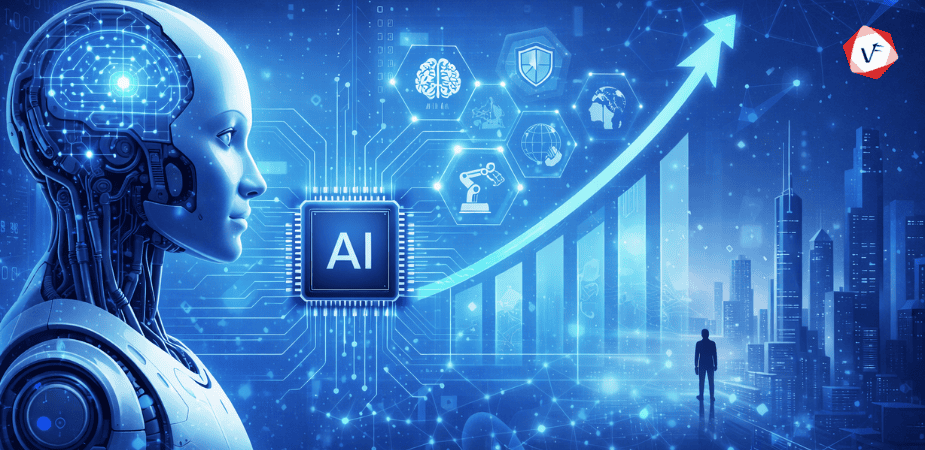How Businesses Are Transforming with AI: A Complete Guide
Quick Answer: Artificial intelligence is transforming businesses through machine learning algorithms, natural language processing, and computer vision technologies that streamline operations, enhance customer experiences, and enable data-driven decision-making across all industries.
Artificial intelligence has become the driving force behind unprecedented business transformation across industries. Organizations are implementing AI solutions to streamline operations, enhance customer experiences, and unlock new revenue streams. From machine learning algorithms that predict market trends to natural language processing systems that automate customer service, AI technologies are fundamentally changing how companies operate.
Business transformation through AI is no longer a futuristic concept but a present reality that determines competitive positioning. Companies that successfully integrate AI into their business processes are experiencing significant improvements in efficiency, decision-making capabilities, and operational performance. The widespread adoption of AI-powered solutions demonstrates how artificial intelligence is reshaping traditional business models and creating opportunities for innovation.
The Foundation of AI-Driven Business Change
Core AI Technologies Enabling Transformation
Business transformation through artificial intelligence begins with understanding the core technologies that make this change possible. Machine learning serves as the backbone of most AI implementations, enabling systems to learn from data patterns and make predictions without explicit programming. Natural language processing allows businesses to analyze customer feedback, automate communication, and extract insights from unstructured text data. Computer vision technologies help companies automate visual inspection processes, enhance security systems, and improve quality control measures.
Leveraging AI for Operational Transformation
Organizations are leveraging these AI technologies to transform their operational frameworks. Predictive analytics powered by machine learning algorithms enable businesses to forecast demand, optimize inventory levels, and reduce waste. Automated decision-making systems help companies respond faster to market changes and customer needs. AI-powered chatbots and virtual assistants are transforming customer service operations by providing 24/7 support and handling routine inquiries efficiently.
Strategic AI Implementation Planning
The integration of AI into business processes requires careful planning and strategic implementation. Companies must assess their current technological infrastructure, identify areas where AI can add value, and develop comprehensive transformation strategies. Successful AI implementation involves training employees, updating systems, and establishing new workflows that maximize the benefits of artificial intelligence technologies.
Operational Excellence Through Smart Automation
AI-Powered Process Automation
AI-driven automation is transforming how businesses manage their daily operations. Robotic process automation combined with machine learning capabilities allows companies to handle repetitive tasks with unprecedented accuracy and speed. Financial institutions use AI algorithms to process loan applications, detect fraudulent transactions, and manage risk assessments automatically. Manufacturing companies implement AI-powered quality control systems that identify defects faster than human inspectors.
Supply Chain Optimization with AI
Supply chain management has been particularly transformed by artificial intelligence applications. AI systems analyze supplier performance, predict potential disruptions, and optimize delivery routes in real-time. Inventory management powered by machine learning algorithms helps businesses maintain optimal stock levels while minimizing carrying costs. Demand forecasting using AI technologies enables companies to adjust production schedules and resource allocation based on predictive insights.
AI in Human Resources Management
Human resources departments are experiencing significant transformation through AI implementation. Recruitment processes now utilize machine learning algorithms to screen candidates, match skills with job requirements, and predict employee retention rates. Performance management systems powered by AI analyze employee productivity patterns and suggest improvements. Training programs enhanced with artificial intelligence provide personalized learning experiences that adapt to individual employee needs.
Customer Experience Revolution
Personalization at Scale
The transformation of customer experiences represents one of the most visible applications of AI in business. Personalization engines powered by machine learning analyze customer behavior patterns, purchase history, and preferences to deliver tailored product recommendations. E-commerce platforms use AI algorithms to create individualized shopping experiences that increase customer satisfaction and drive sales growth.
Intelligent Customer Service Solutions
Customer service operations have been fundamentally transformed through AI implementation. Intelligent chatbots handle multiple customer inquiries simultaneously, providing instant responses and escalating complex issues to human agents when necessary. Sentiment analysis powered by natural language processing helps businesses understand customer emotions and adjust their communication strategies accordingly. Voice recognition systems enable hands-free customer interactions and improve accessibility for users with disabilities.
AI-Enhanced Marketing Strategies
Marketing strategies have been enhanced significantly through AI-powered analytics and automation. Machine learning algorithms analyze customer segments, predict buying behaviors, and optimize marketing campaigns for maximum effectiveness. Content generation systems create personalized email campaigns, social media posts, and product descriptions at scale. Attribution modeling using AI helps businesses understand which marketing channels drive the highest return on investment.
Data-Driven Decision Making
Advanced Business Intelligence
Business intelligence has been transformed through the integration of artificial intelligence technologies. Advanced analytics powered by machine learning provide deeper insights into business performance, market trends, and customer behaviors. Predictive modeling helps executives make informed decisions about future investments, product developments, and strategic initiatives. Real-time data processing capabilities enable businesses to respond quickly to changing market conditions.
AI-Powered Financial Analysis
Financial analysis has been enhanced through AI implementation across various business functions. Automated reporting systems generate comprehensive financial statements, performance dashboards, and compliance reports with minimal human intervention. Risk assessment algorithms analyze market volatility, creditworthiness, and investment opportunities more accurately than traditional methods. Fraud detection systems powered by machine learning identify suspicious patterns and prevent financial losses.
Strategic Planning with AI
Strategic planning processes have been transformed through AI-powered scenario modeling and forecasting. Businesses use artificial intelligence to simulate different market conditions, evaluate potential outcomes, and develop contingency plans. Competitive analysis enhanced with AI helps companies understand market positioning, identify opportunities, and develop differentiation strategies.
Industry-Specific Transformations
Healthcare AI Innovation
Healthcare organizations are implementing AI technologies to improve patient outcomes and operational efficiency. Medical imaging systems powered by computer vision help radiologists detect diseases earlier and more accurately. Electronic health records enhanced with natural language processing extract valuable insights from patient data. Drug discovery processes accelerated by machine learning algorithms reduce development timelines and costs significantly.
Financial Services Transformation
Financial services have experienced a substantial transformation through AI adoption. Algorithmic trading systems make investment decisions based on market data analysis and predictive modeling. Credit scoring models powered by machine learning assess borrower risk more comprehensively than traditional methods. Insurance companies use AI algorithms to automate claims processing, detect fraud, and price policies more accurately.
Retail Business Evolution
Retail businesses are transforming their operations through comprehensive AI integration. Inventory optimization systems predict demand fluctuations and adjust stock levels automatically. Price optimization algorithms analyze competitor pricing, market conditions, and customer behavior to maximize profitability. Store layout optimization powered by customer movement analytics improves shopping experiences and increases sales conversion rates.
Overcoming Implementation Challenges
Data Quality and Integration
Successful AI transformation requires addressing several implementation challenges that businesses commonly encounter. Data quality issues can significantly impact AI system performance, making data preparation and cleaning essential components of any AI project. Integration complexities arise when connecting AI solutions with existing business systems and workflows. Change management becomes crucial as employees adapt to new AI-powered processes and tools.
Infrastructure and Skills Requirements
Technical infrastructure requirements for AI implementation often exceed current capabilities, necessitating significant technology investments. Skill gaps in AI technologies require comprehensive training programs and strategic hiring initiatives. Regulatory compliance considerations become increasingly important as AI systems handle sensitive business and customer data.
Security and Ethical Considerations
Security concerns related to AI implementation require robust cybersecurity measures and privacy protection protocols. Bias mitigation in AI algorithms ensures fair and ethical decision-making processes. Performance monitoring and maintenance of AI systems demand ongoing attention and resources to maintain optimal functionality.
Measuring Success & ROI
Key Performance Indicators
Businesses must establish clear metrics and measurement frameworks to evaluate AI transformation success. Key performance indicators for AI projects include efficiency improvements, cost reductions, revenue increases, and customer satisfaction scores. Return on investment calculations for AI initiatives consider implementation costs, ongoing maintenance expenses, and quantifiable business benefits.
Operational Performance Metrics
Operational metrics help businesses track the performance of AI systems and identify areas for improvement. Processing speed improvements, accuracy rates, and error reductions provide tangible evidence of AI transformation benefits. Customer engagement metrics, including response times, resolution rates, and satisfaction scores, demonstrate the impact of AI on customer experiences.
Strategic Business Outcomes
Long-term success metrics focus on strategic business outcomes rather than just technical performance. Market share growth, competitive positioning improvements, and innovation capabilities represent the broader impact of AI transformation on business success. Cultural transformation metrics assess how well organizations adapt to AI-powered workflows and decision-making processes.
The Path Forward
Business transformation through artificial intelligence continues to accelerate as technologies advance and become more accessible. Organizations must develop comprehensive AI strategies that align with their business objectives and operational requirements. Investment in AI technologies, employee training, and infrastructure upgrades will determine which businesses successfully navigate this transformation.
Final Thoughts
Collaboration between business leaders, technology teams, and AI specialists becomes essential for successful implementation. Continuous learning and adaptation ensure that AI systems remain effective as business needs and market conditions change. The businesses that successfully transform with AI will gain sustainable advantages in efficiency, customer satisfaction, and market positioning.
For organizations seeking expert guidance in this journey, Vofox’s AI/ML development services provide comprehensive solutions that drive meaningful business transformation and deliver measurable results across diverse industry applications. Want to know more? Have a call with us now.





